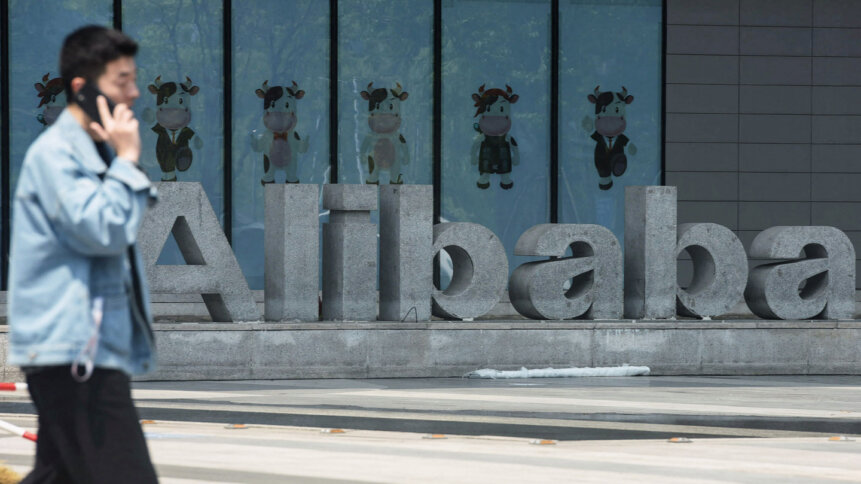Alibaba launches generative AI chatbot – just before China lays down prescriptive rules

|
Getting your Trinity Audio player ready...
|
It’s been on the horizon since the initial launch of ChatGPT by the Microsoft-backed OpenAI, but now Chinese multinational tech giant Alibaba has launched its own generative AI, which will be known as Tongyi Qianwen (“Truth from a thousand questions”).
One of life’s most tiresomely accurate truisms is that timing is everything. Shortly after Alibabi launched Tongyi Qianwen and announced that it would be folded into a range of the company’s products in the near future, the Chinese government released a set of draft rules specifically discouraging Chinese companies from creating or offering any ChatGPT-like generative AI services.
The misinformation misinformation.
The government, in a display of chutzpah so impressive it deserves its own word in the Chinese language, claims that ChatGPT and other similar chatbots could be used by the US government to “spread misinformation.”
While there’s some degree of truth in the fact that generative AIs lack an objective source of truth, and therefore can be impressively wrong with the kind of certainty you’d find in a Friday night bar or a Facebook bubble, the idea that they’re wrong on purpose, or in a US government-guided way, is almost as paranoid as US legislators threatening to ban TikTok in the country as a security threat.
What the government’s plans mean for Alibaba’s well-meaning launch is as yet uncertain. Tongyi Qianwen, from its initial demonstration, appears to be familiar to ChatGPT users, without necessarily extending the state of the art to any noticeable degree. Initial plans were to roll the chatbot out in Alibaba’s workplace messaging system, DingTalk, and in its Tmall Genie smart speakers (the Alibaba equivalent of Alexa), with further rollouts across Alibaba’ spectrum of applications to follow.
In particular, and most interestingly from a technological perspective, there were plans to release Tongyi Qianwen onto Alibaba’s cloud services, so that clients and customers could effectively build their own large language models, customized to their own particular usages, vocabularies, and prompt-needs.
The question of data security.
When the Cyberspace Administration of China released its draft rules, it walked a line of logic that was razor-thin and difficult to dance on. It said the country supported the innovation and popularization of generative AI (while, naturally, not allowing ChatGPT to offer its services to people inside China), but that content generated by any generative AI to operate within China would have to adhere to “core socialist values,” as well as the country’s laws on data security.
Perhaps annoyingly for the likes of OpenAI, Google and Alibaba, there’s real weight behind some of those concerns – Italy has become the first country in the world to (at least temporarily) ban the use of ChatGPT on the grounds of data collection and usage, and is unlikely to reinstate the technology until or unless OpenAI can show its workings, policies and to some extent its ethics over data privacy.
That has pricked up the ears of other jurisdictions, and while no other nation has yet joined the boycott, several are understood to be looking at the issue – including, crucially, the US itself. Again, there’s logic there – the US can hardly justify labelling TikTok as a national security threat over its data gathering and usage policies and then appear entirely sanguine over ChatGPT.
And of course, academics and tech leaders, via the medium of the Future of Life Institute made headlines, if not necessarily disinterested arguments, in a recent open letter (with just under 23,000 signatories at the time of writing), asking for a pause on developments of generative AI at anything above the level of GPT-4, claiming the race to a potentially dangerous end point is being run too fast and without necessary and valuable scrutiny.
The Kool-Aid of many colors.
None of that will have mattered to Alibaba – after all, both the Italian ban and the Future of Life Institute’s open letter were already matters of fact when it launched Tongyi Qianwen. The Chinese government’s rules though might see it run into significant trouble, because of the conflict between how Tongyi Qianwen has been trained, like its fellow generative AI chatbots, using vast swathes of data from across the internet, and that rule about generated content having to adhere to “core socialist values.”
The internet that will have trained Tongyi Qianwen is by no means exclusively socialist. In fact, the whole point of the internet is that it’s in no sense exclusively anything.
That means any generative AI aiming to operate within the Chinese rules will either need a significant filtering mechanism added to it, so it only seeks its “truth from a thousand questions” from solidly state-approved socialist sources, or it would need to be radically and restrictively retrained on a significantly smaller training domain than, for instance, Tongyi Qianwen will have used in an attempt to go toe to toe with the likes of ChatGPT and Bard.
Perhaps ironically, the Chinese draft rules highlight ways in which generative AI chatbots could be used to spread intentional misinformation – if a system were to be trained only on socialist values (or only capitalist values, for that matter), and then access to alternative chatbots were disallowed from a portion of the population, it would be perhaps the ultimate end result of the likes of social media bubbles.
If you could only get results from a single chatbot, and that chatbot had been trained only to generate content that fell within certain parameters of “truth,” users would potentially grow up only being able to know a very particular truth – be it a socialist truth, a capitalist truth, a Flat Earth truth, a Young Earth truth, a QAnon truth, a Moon landing hoax truth, or any other truth someone else chose them to know. The generative AI-abetted Kool-Aid could potentially make everybody certain they knew the truth, when that knowledge had been deliberately curtailed.
What the Chinese draft rules will mean for Alibaba’s plans – or indeed the plans of any other company planning to launch generative AI chatbots for use in China – remains as yet uncertain. What seems clear though is that such plans face some interesting times in the months and years ahead.










